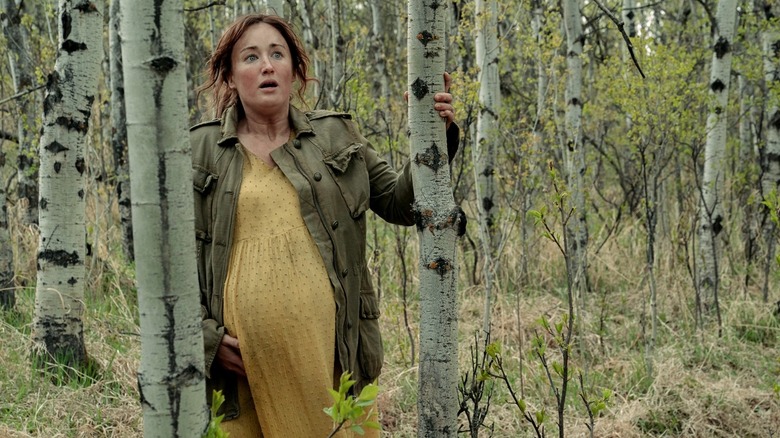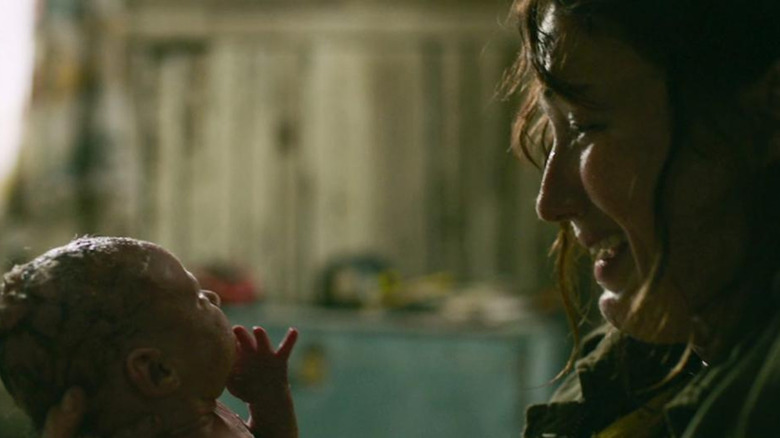The Last Of Us Explained One Of The Game's Biggest Mysteries, But It Shouldn't Have
This post contains spoilers for the season 1 finale of "The Last of Us."
It is undeniable that one of the most important plot details from "The Last of Us" is that Ellie, the game's secondary protagonist, is somehow immune to the disaster-inducing Cordyceps infection. Although she was bitten, the fungus seems to have stagnated in her body, and no one appears to know why. If you've played the first and second games in Naughty Dog's acclaimed series, you'll know that the answer isn't exactly the most satisfying — the truth is that the game never tells us or even suggests a reason why Ellie is immune. It's just a fact that we as the player have to deal with.
That isn't the case with the game's HBO adaptation. Just like it explained how a brain-eating fungus caused the apocalypse, "The Last of Us" TV series explains how Ellie (Bella Ramsey) ends up with immunity through a harrowing cold open in its season finale. Before the opening credits roll, we see a woman named Anna (Ashley Johnson, who portrayed Ellie in both video games) running into a house while heavily pregnant. Her water breaks as she tries to hide from something, and we find out the thing she's fleeing from is a Runner. Anna fights with the infected person after it breaks down the door. She ultimately stabs it to death, but she then realizes two things: First, the pressure from the encounter caused her to give birth to her child, and second, the Runner managed to bite her leg.
Things better left unsaid
If you didn't catch that, the show implies that the Runner, via the bite to Anna's leg, exposed a newborn Ellie to Cordyceps as she was getting pushed out of Anna's womb. It's not entirely clear whether this would make any sense scientifically, especially since it's still unknown how fast the fungus can spread. The show, however, strongly implies that she was born with Cordyceps already in her body, making her effectively immune. Hey, if you've seen Zack Snyder's remake of "Dawn of the Dead," you know that there could have been a much worse outcome.
The problem, however, is that we didn't really need to know this. In the game, the ambiguity over her immunity fits in line with its various themes, particularly how there are just some things in life that are too difficult to comprehend. To the characters that we follow, it's not important that they figure out the precise cause and cure for Cordyceps. Their main focus is survival and trying to make it for another day. If it wasn't for Marlene (Merle Dandridge) realizing the potential of Ellie's immunity, Ellie likely would have been the same way. Ellie's immunity is also the least interesting aspect of her and Joel's relationship. "The Last of Us" works because they have a compelling father-daughter dynamic, with her special ability just being a tiny piece of the greater puzzle.
The overarching problem
When you focus too much on trying to find an explanation for these types of things, you'll likely end up losing more in the process. This is exactly why, as a cohesive unit, the season finale of "The Last of Us" just doesn't work. The episode had an overarching lack of subtlety and a need to explain every loose plot point that the game introduced. For instance, the pivotal decision Joel (Pedro Pascal) makes to save Ellie is stripped of its moral ambiguity, as his decision to kill off Marlene and the other Fireflies at the hospital is framed as the wrong decision to make. He knows why Ellie is immune and understands that she is the key to saving humanity, but still decides to save her life at the cost of a cure.
While it's undeniable that Joel was selfish and cruel, what made that original ending so intriguing was how morally grey it was. Sure, he shouldn't have killed the Fireflies, but he also had no idea why or how Ellie was immune, so the risk of her death being for nothing was much higher. The show's finale spells the exact opposite out in excruciating detail, just like it did with the reveal of Ellie's immunity.
It's a shame that "The Last of Us" didn't stick the landing because it really did prove that video game adaptations can be both faithful and standalone if the right choices were made. Unfortunately, explaining Ellie's immunity was not one of those.


